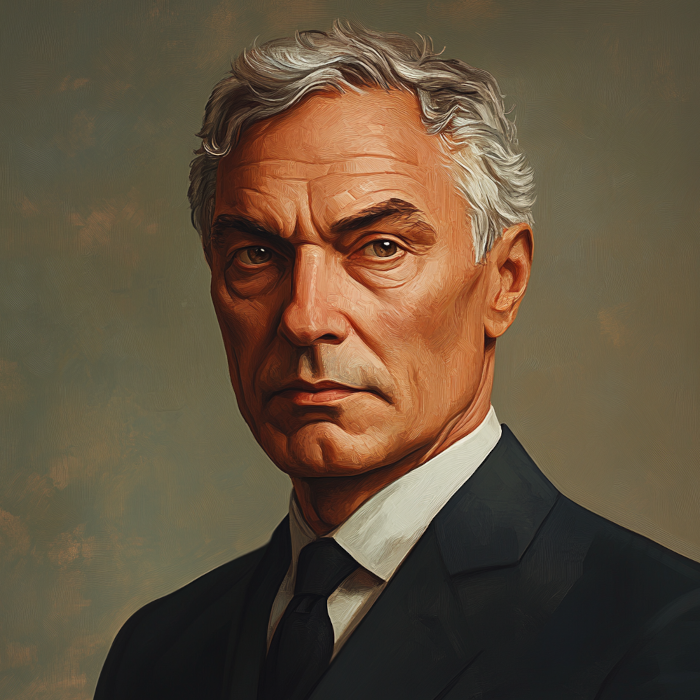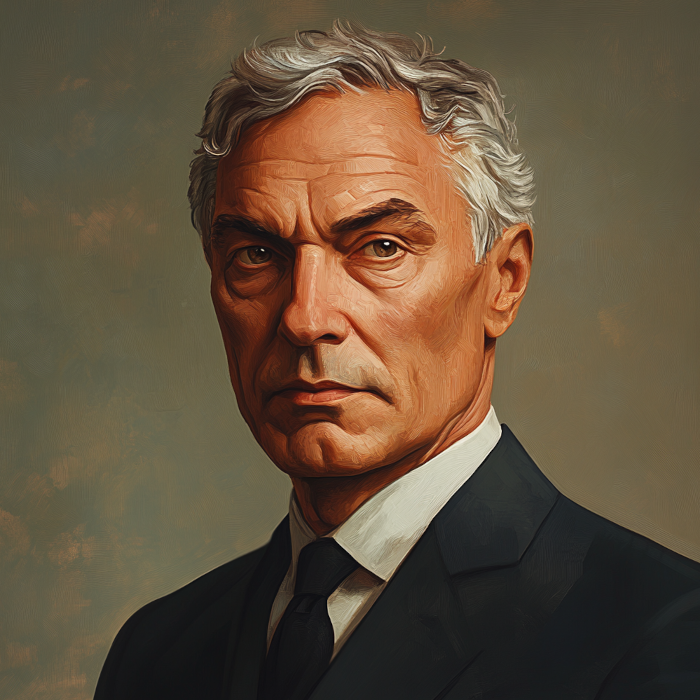


Boris Leonidovich Pasternak (1890–1960) was a Russian poet, novelist, and literary translator, best known for his novel "Doctor Zhivago", which earned him the Nobel Prize in Literature in 1958. Pasternak was a prominent figure in Russian literature and gained recognition for his deeply lyrical and philosophical poetry, which explored themes of love, nature, and the human spirit. His novel "Doctor Zhivago," set against the backdrop of the Russian Revolution and Civil War, was an epic portrayal of love and resilience during times of upheaval. Despite being celebrated internationally, Pasternak faced intense criticism and persecution from the Soviet authorities for his work.
Birth and Family Background: Boris Pasternak was born on February 10, 1890, in Moscow, into a highly artistic and intellectual family. His father, Leonid Pasternak, was a well-known painter and a professor at the Moscow School of Painting, Sculpture, and Architecture. His mother, Rosa Kaufman, was a talented concert pianist. The Pasternak household was a cultural hub, frequented by famous artists and writers, including Leo Tolstoy, who was a close family friend.
Early Education and Interest in Music: As a child, Pasternak initially showed a great interest in music, largely due to his mother's influence. He studied composition at the Moscow Conservatory under Alexander Scriabin, a renowned Russian composer. However, in 1910, Pasternak decided to abandon music in favor of philosophy and literature. He enrolled at Moscow University, where he studied philosophy, and later spent a brief period at the University of Marburg in Germany, studying under the influential neo-Kantian philosopher Hermann Cohen.
Transition to Literature: Pasternak's experiences in Marburg influenced his intellectual development, but by 1912, he had decided to dedicate himself entirely to poetry. He returned to Moscow and became involved in the city's vibrant literary scene. He began publishing his poems and quickly gained a reputation for his rich, evocative language and profound reflections on the human experience.
Association with the Futurists: In the early 1910s, Pasternak became associated with the Futurist movement in Russian poetry, which sought to break away from traditional forms and embrace experimental language. He was influenced by avant-garde poets such as Vladimir Mayakovsky and Velimir Khlebnikov. Pasternak's early works, such as his poetry collection "My Sister, Life" (1922), showed his skill in combining vivid imagery with a deep sense of introspection. "My Sister, Life" is considered one of the most important collections of Russian poetry in the 20th century, marking a turning point in Pasternak's career and establishing him as a leading poet.
Themes and Style: Pasternak's poetry is known for its intricate use of metaphor, musicality, and sensory imagery. He drew inspiration from the beauty of nature, the complexities of love, and the broader questions of existence. His work often reflected his interest in philosophy and mysticism, exploring the relationship between the individual and the universe. He was deeply influenced by the tumultuous events of the Russian Revolution and Civil War, and his writing conveyed both the beauty and suffering of the world around him.
Poetry Collections: Pasternak's subsequent poetry collections, including "Themes and Variations" (1923) and "Second Birth" (1932), further established his reputation as one of the most original voices in Russian literature. His work evolved from the exuberance of his early Futurist-influenced poems to a more introspective and philosophical tone. Pasternak's poetry often conveyed a sense of wonder at the natural world, juxtaposed with reflections on human frailty and the passing of time.
The Soviet Regime and Literary Challenges: The establishment of the Soviet Union brought significant challenges to Pasternak's literary career. As a poet, he found it increasingly difficult to conform to the demands of socialist realism, the official artistic style of the Soviet state that required artists to glorify the Communist Party and the ideals of socialism. Unlike many of his contemporaries, Pasternak refused to write propagandistic works, instead focusing on the inner life and personal experiences of individuals, which often put him at odds with the Soviet authorities.
Literary Translation Work: To avoid direct conflict with the Soviet government and to support himself financially, Pasternak turned to literary translation. He translated some of the greatest works of Western literature into Russian, including plays by William Shakespeare (such as "Hamlet" and "Macbeth"), poems by Johann Wolfgang von Goethe, and works by Heinrich von Kleist. Pasternak's translations were highly acclaimed for their poetic quality and faithfulness to the spirit of the originals, and they helped introduce Russian readers to the great works of European literature.
Persecution and Isolation: Despite his popularity as a translator and poet, Pasternak faced increasing persecution from the Soviet literary establishment. During the Great Purge of the late 1930s, many of his friends and fellow writers, including Osip Mandelstam and Isaac Babel, were arrested and executed. Pasternak himself managed to avoid arrest, but he lived under constant surveillance and pressure to conform to the demands of the state. He withdrew from public life and focused on his translations and his own writing, often working in isolation.
Writing "Doctor Zhivago": Pasternak began working on his most famous novel, "Doctor Zhivago", during World War II and continued to write and revise it over the next decade. The novel is a sweeping epic set against the backdrop of the Russian Revolution and Civil War, following the life of Yuri Zhivago, a physician and poet, as he struggles to navigate the chaos and upheaval of the times. The story is a powerful exploration of love, loss, and the resilience of the human spirit in the face of historical tragedy. "Doctor Zhivago" also reflects Pasternak's belief in the importance of personal integrity and individual freedom in a world increasingly dominated by ideologies.
Rejection in the Soviet Union: Pasternak completed "Doctor Zhivago" in 1956, but the novel was rejected for publication by Soviet publishers due to its perceived anti-Soviet themes and its depiction of the Revolution's impact on the lives of ordinary people. The Soviet authorities viewed the novel as subversive, as it presented a critical and nuanced view of the Revolution and did not conform to the ideals of socialist realism. Despite being banned in the Soviet Union, the manuscript was smuggled out of the country and published in Italy in 1957.
International Acclaim and Nobel Prize: "Doctor Zhivago" quickly gained international acclaim, and in 1958, Boris Pasternak was awarded the Nobel Prize in Literature for his "important achievement both in contemporary lyric poetry and in the field of the great Russian epic tradition." The award brought Pasternak worldwide recognition but also led to severe consequences at home. The Soviet government launched a campaign of harassment against Pasternak, accusing him of betraying his country and subjecting him to intense public criticism. Under pressure from the authorities and fearing for the safety of his family, Pasternak was forced to decline the Nobel Prize.
Persecution and "I am lost to my country": The Soviet Union's persecution of Pasternak following the Nobel Prize announcement deeply affected him. He was expelled from the Union of Soviet Writers, which left him without an income, and he became a target of vicious attacks in the state-controlled media. Pasternak wrote to Premier Nikita Khrushchev, expressing his love for Russia and asking for clemency. In response to the persecution, Pasternak famously wrote: "I am lost to my country, but it would be unbearable to be lost to it completely." Despite the state's hostility, Pasternak remained in his beloved country, refusing offers to emigrate to the West.
Final Years: The last years of Pasternak's life were marked by ill health and isolation. Despite being ostracized by the Soviet literary establishment, he continued to write, producing a number of poems that reflected his love for life, his connection to nature, and his belief in the endurance of the human spirit. These later poems, often referred to as his "Last Poems", are characterized by their clarity, simplicity, and philosophical depth.
Death (1960): Boris Pasternak died of lung cancer on May 30, 1960, at his dacha in Peredelkino, near Moscow. His funeral was attended by thousands of admirers, who defied the official ban on honoring him to pay their respects. Pasternak's death marked the end of a remarkable literary career, one that was marked by both immense achievement and profound struggle.
"Doctor Zhivago": Despite being banned in the Soviet Union for several decades, "Doctor Zhivago" became one of the most famous Russian novels of the 20th century. The book's international success and its portrayal of individual resilience and personal integrity resonated with readers worldwide. In 1965, the novel was adapted into a film directed by David Lean, which became a major success and won several Academy Awards. The character of Yuri Zhivago, with his poetic sensibility and moral courage, became an enduring symbol of the struggle for personal freedom in an oppressive society.
Restoration and Rehabilitation: Pasternak's reputation in Russia began to improve after his death. In 1987, during the period of glasnost under Mikhail Gorbachev, Pasternak was formally rehabilitated, and "Doctor Zhivago" was finally published in the Soviet Union in 1988—nearly three decades after his death. Pasternak's acceptance of the Nobel Prize was also acknowledged posthumously, and his contributions to Russian literature were celebrated once again.
Contribution to Russian Poetry: Pasternak's poetry remains highly influential in Russian literature. His unique voice, characterized by its vivid imagery, lyrical beauty, and philosophical depth, set him apart from his contemporaries. He is often compared to other great Russian poets, such as Alexander Pushkin and Anna Akhmatova, and his work continues to inspire both readers and writers with its celebration of the beauty of the natural world, the complexity of human emotions, and the resilience of the human spirit.
Translations and Cultural Impact: In addition to his original works, Pasternak's translations of Shakespeare and other great Western authors have left a lasting impact on Russian culture. His translations brought the richness of Western literature to Russian audiences, and they are still highly regarded for their poetic quality and accuracy. Pasternak's influence extended beyond literature, impacting music, film, and other forms of artistic expression.
Boris Pasternak was one of the most significant and complex figures in 20th-century Russian literature. As a poet, novelist, and translator, Pasternak created works that explored the beauty of life, the power of love, and the resilience of the human spirit in the face of historical upheaval. His novel "Doctor Zhivago", which earned him international acclaim and the Nobel Prize in Literature, remains a powerful and enduring portrait of personal integrity in a time of revolution and chaos.
Despite facing persecution and isolation from the Soviet authorities, Pasternak stayed true to his artistic vision and continued to write with profound sincerity and depth. His legacy as a writer and thinker who celebrated the individual and the beauty of the world around him continues to resonate with readers today. Pasternak's work stands as a testament to the enduring power of art, poetry, and the human spirit in the face of political repression and societal change.

We use cookies
We use cookies and other tracking technologies to improve your browsing experience on our website, to show you personalized content and targeted ads, to analyze our website traffic, and to understand where our visitors are coming from. Privacy Policy.